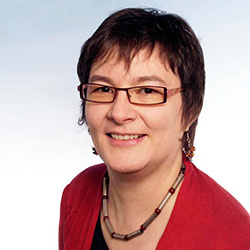-
June 27, 2014
-
1:00 PM
-
INF E023
-
English

Download Flyer
Summary
Novel interface technologies such as touchscreens and embedded or tangible computing systems bring computational abilities into our everyday environment, opening a design space for novel applications and devices as well as engendering new kinds of uses. In our research with the HCI group at BUW as well as in our previous work in the UK, we have explored how we can design physical computing technologies so as to generate novel user experiences, in particular focusing on supporting social interaction and collaboration. New interaction techniques that do not tether the use to a monitor in combination with the distribution and embedding of digital technology into our physical environment allow for more natural collaboration and may even be utilized to intentionally provoke social interactions. The embodied nature of the interaction (and the devices/systems) furthermore changes the user experience. In this talk I will give an overview of our research which explores applications and uses of physical-digital technologies in a range of domains, such as museum installations, urban media interventions, and the influence of alternative modality data representations on subjective user experience.
Vita

Eva Hornecker is a Professor in Human-Computer Interaction at the Bauhaus-Universität Weimar. Previously, she was a lecturer at the University of Strathclyde in the UK, and worked in post-doctoral positions in the UK, Austria and New Zealand. Her research focus is on understanding and designing for people's social interactions with and around novel 'beyond the desktop' interfaces, in particular concerning tangible and embodied interaction. She proposed a unifying tangible interaction framework at CHI'06 that helped to establish TEI as an interdisciplinary and diverse research area, and co-founded the international Tangible, Embedded and Embodied Interaction conference series (TEI) in 2007. Her work is located in the intersection between technology, design, and the social sciences.
 Eva Hornecker is a Professor in Human-Computer Interaction at the Bauhaus-Universität Weimar. Previously, she was a lecturer at the University of Strathclyde in the UK, and worked in post-doctoral positions in the UK, Austria and New Zealand. Her research focus is on understanding and designing for people's social interactions with and around novel 'beyond the desktop' interfaces, in particular concerning tangible and embodied interaction. She proposed a unifying tangible interaction framework at CHI'06 that helped to establish TEI as an interdisciplinary and diverse research area, and co-founded the international Tangible, Embedded and Embodied Interaction conference series (TEI) in 2007. Her work is located in the intersection between technology, design, and the social sciences.
Eva Hornecker is a Professor in Human-Computer Interaction at the Bauhaus-Universität Weimar. Previously, she was a lecturer at the University of Strathclyde in the UK, and worked in post-doctoral positions in the UK, Austria and New Zealand. Her research focus is on understanding and designing for people's social interactions with and around novel 'beyond the desktop' interfaces, in particular concerning tangible and embodied interaction. She proposed a unifying tangible interaction framework at CHI'06 that helped to establish TEI as an interdisciplinary and diverse research area, and co-founded the international Tangible, Embedded and Embodied Interaction conference series (TEI) in 2007. Her work is located in the intersection between technology, design, and the social sciences.